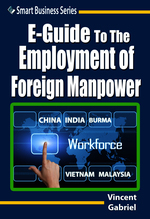About the Author: Vincent Gabriel
Vincent A. Gabriel has written E-guide: The Employment Act after completing two print editions of the Employment Act. He has completed two print editions of an Employment Manual. He lectures on the employment of foreign workers and the laws related to Human Resource matters.
Professional Qualifications and Memberships
*Advanced Certificate in Training and Assessment (ACTA) through STADA
*Certificate in Urban Education (Chinese University, HK)
*Certificate in Non-Formal Education (University of the Philippines, Los Banos)
*B S c (Econs) Hons University of London External Degree
*TTC Certificate in Education with Distinction in Comparative Education

The Singapore economy has undergone drastic changes. There is less and less of the traditional activities. A simple example is that Singapore has lost its place as the No. 1 port, yet Singapore remains a shipping and maritime hub.
Europeans find Singapore a convenient connection to the fast growing business opportunities of China and India and now Burma (also called Myanmar).
India and Burma represent the new frontier opportunities — What China was two decades ago of underpriced assets and a labour force willing to put in the effort.
Amidst this background the Singaporean worker Gen X vintage is rewarded according to his/her performance. The old cap on wages has been jettisoned. The gap between the average high performer who earns $50,00 and the cleaner who earns $850 is too great to be acceptable.
Drastic steps are being taken to bring the definition of low wage to be not less than a $1,000 a month. Creative steps are being undertaken by the government, the labour movement and employees to train and to do whatever is needed to bring up and maintain that wage level.
This means that foreigners on work permits should not be brought in, as they tend to cause wages to fall unless these foreigners earn at least $1,300 a month.
The relationship between foreigners on work passes and Singaporean workers (at these entry levels) is a love-hate relationship. On the one hand Singapore love to have "maids" (FDWs), marine contractors, labourers, healthcare workers, but on the other hand the 'S' pass holders, the EP holders, who compete with tertiary-educated Singaporean at entry levels the relationship is not so receptive. Young graduates must be given
a chance to enter the workforce.
This book explains the employment regulations of hiring foreign manpower in Singapore and teaches how you the employer can comply with the Singapore labour laws.
 The Singapore economy has undergone drastic changes. There is less and less of the traditional activities. A simple example is that Singapore has lost its place as the No. 1 port, yet Singapore remains a shipping and maritime hub.
The Singapore economy has undergone drastic changes. There is less and less of the traditional activities. A simple example is that Singapore has lost its place as the No. 1 port, yet Singapore remains a shipping and maritime hub.